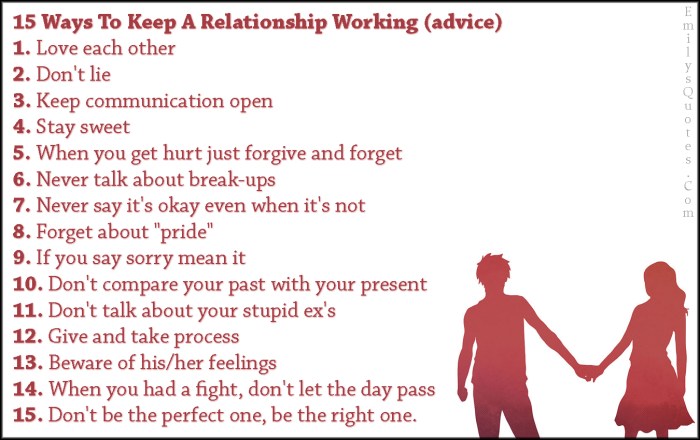Relationship Advice sets the stage for this enthralling narrative, offering readers a glimpse into a story that is rich in detail with American high school hip style and brimming with originality from the outset.
When it comes to matters of the heart, seeking guidance and wisdom can make all the difference. From resolving conflicts to building trust, relationship advice plays a vital role in nurturing healthy and fulfilling connections. Let’s dive into the world of relationship advice and discover its impact on love and communication.
Importance of Relationship Advice

In the ever-changing landscape of relationships, seeking advice is crucial to navigate the ups and downs that come with it. Whether you’re facing conflicts, communication issues, or simply looking to strengthen your bond, relationship advice can provide valuable insights and guidance.
Resolving Conflicts
- Relationship advice offers an outside perspective on conflicts, helping you see things from a different angle.
- By providing strategies and tools to address disagreements, advice can assist in finding common ground and reaching resolutions.
- Learning effective conflict resolution skills can prevent small issues from escalating into larger problems.
Improving Communication
- Relationship advice can enhance communication by teaching active listening and effective expression of thoughts and feelings.
- It encourages open and honest conversations, fostering a deeper understanding between partners.
- Through communication exercises and techniques, advice can help break down barriers and strengthen the emotional connection in a relationship.
Types of Relationship Advice

Relationship advice can come from a variety of sources, each with its own unique perspective and approach. It’s important to understand the differences between professional advice, advice from friends or family, and self-help books in order to make informed decisions about your relationship.
Professional Relationship Advice
Professional relationship advice is typically provided by therapists, counselors, or relationship experts. These professionals have training and experience in helping individuals navigate the complexities of relationships. They offer unbiased and objective guidance based on psychological principles and therapeutic techniques. Professional advice can be beneficial for addressing deep-rooted issues and improving communication within a relationship.
Advice from Friends or Family
Advice from friends or family members is often well-intentioned but may be biased or based on personal experiences. While loved ones may offer support and empathy, their advice may not always be grounded in expertise or objectivity. It’s important to consider the source of the advice and whether it aligns with your own values and goals in the relationship.
Self-Help Books
Self-help books on relationships offer a wealth of information and strategies for improving communication, resolving conflicts, and strengthening emotional connections. These books are written by relationship experts and psychologists, providing evidence-based advice and practical exercises for couples to work through together. While self-help books can be a valuable resource, it’s essential to choose carefully and consider the credibility of the author and the relevance of the content to your specific situation.
Effective Communication in Relationships
Effective communication is the cornerstone of a healthy and successful relationship. It allows partners to express their thoughts, feelings, and needs openly and honestly, fostering trust and understanding between them. Good communication helps to resolve conflicts, strengthen emotional bonds, and build a strong foundation for a lasting relationship.
Importance of Effective Communication
Effective communication is crucial in relationships as it:
- Builds trust and intimacy between partners.
- Helps resolve conflicts and misunderstandings.
- Improves overall relationship satisfaction.
- Encourages empathy and understanding.
Strategies for Improving Communication
To enhance communication with your partner, consider the following strategies:
- Active listening: Pay attention to your partner without interrupting, show empathy, and validate their feelings.
- Use “I” statements: Express your thoughts and feelings using phrases like “I feel” or “I think” to avoid blame or defensiveness.
- Practice openness: Be honest and transparent about your emotions, needs, and concerns.
- Set aside dedicated time for communication: Create a safe space for open dialogue and discussions without distractions.
Examples of Miscommunication in Relationships
Miscommunication can lead to misunderstandings and conflicts in relationships. For instance:
- Assuming intentions: Misinterpreting your partner’s actions or words can lead to unnecessary arguments.
- Unspoken expectations: Failing to communicate your needs or desires clearly can result in unmet expectations and disappointment.
- Invalidating feelings: Dismissing or minimizing your partner’s emotions can create distance and resentment in the relationship.
Building Trust and Intimacy: Relationship Advice
Building trust and intimacy are essential components of a healthy and strong relationship. Trust forms the foundation of a relationship, creating a sense of security and reliability between partners. Intimacy, on the other hand, fosters emotional connection and closeness, enhancing the bond between partners.
Significance of Trust in a Relationship
Building trust with your partner is crucial for a successful relationship. Trust allows partners to feel safe, vulnerable, and open with each other. Without trust, doubts and insecurities can arise, leading to misunderstandings and conflicts. Trust is earned over time through honesty, reliability, and consistent behavior.
- Communicate openly and honestly with your partner.
- Be reliable and follow through on commitments.
- Avoid lying or keeping secrets from your partner.
- Show empathy and understanding towards your partner’s feelings and concerns.
Significance of Intimacy in a Relationship
Intimacy plays a crucial role in strengthening the emotional connection between partners. It involves physical closeness as well as emotional vulnerability, allowing partners to share their deepest thoughts, feelings, and desires with each other. Intimacy enhances trust, communication, and overall relationship satisfaction.
- Engage in open and honest conversations about your thoughts and feelings.
- Express affection and appreciation towards your partner regularly.
- Be attentive to your partner’s needs and desires.
- Engage in activities that promote bonding and closeness, such as cuddling or sharing intimate moments together.
Overcoming Relationship Challenges
Relationships are not always smooth sailing, and challenges are bound to arise. It’s important to address these issues head-on to maintain a healthy and strong connection with your partner.
Identifying Common Challenges, Relationship Advice
- Communication breakdown: Misunderstandings and lack of effective communication can lead to conflicts in a relationship.
- Trust issues: Past experiences or insecurities can create trust issues, affecting the bond between partners.
- Differences in values or goals: Misalignment in values and goals can cause friction and disagreements in a relationship.
Strategies for Overcoming Trust Issues
- Open and honest communication: Discuss your concerns and insecurities with your partner to rebuild trust.
- Setting boundaries: Establish clear boundaries and expectations to create a sense of security in the relationship.
- Seeking therapy: Consider couples therapy or counseling to work through trust issues with the help of a professional.
Importance of Compromise and Understanding
- Compromise is key: Both partners should be willing to make compromises and meet halfway to resolve conflicts.
- Practice empathy: Understanding your partner’s perspective and feelings can help in finding common ground and resolving disagreements.
- Patience is crucial: Building a strong relationship takes time and effort, so be patient with each other during challenging times.